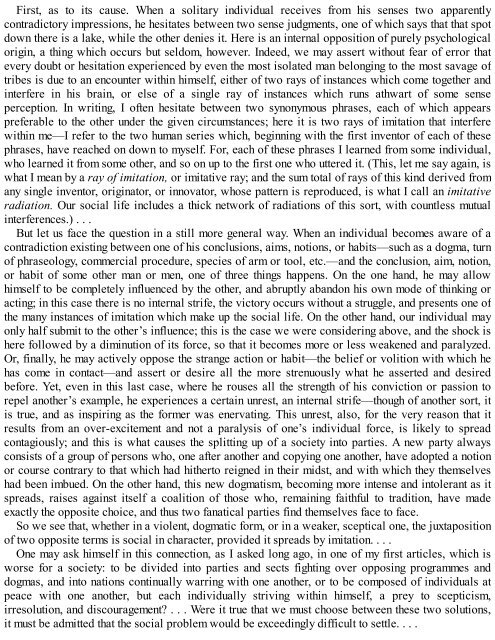3658925934
You also want an ePaper? Increase the reach of your titles
YUMPU automatically turns print PDFs into web optimized ePapers that Google loves.
First, as to its cause. When a solitary individual receives from his senses two apparently<br />
contradictory impressions, he hesitates between two sense judgments, one of which says that that spot<br />
down there is a lake, while the other denies it. Here is an internal opposition of purely psychological<br />
origin, a thing which occurs but seldom, however. Indeed, we may assert without fear of error that<br />
every doubt or hesitation experienced by even the most isolated man belonging to the most savage of<br />
tribes is due to an encounter within himself, either of two rays of instances which come together and<br />
interfere in his brain, or else of a single ray of instances which runs athwart of some sense<br />
perception. In writing, I often hesitate between two synonymous phrases, each of which appears<br />
preferable to the other under the given circumstances; here it is two rays of imitation that interfere<br />
within me—I refer to the two human series which, beginning with the first inventor of each of these<br />
phrases, have reached on down to myself. For, each of these phrases I learned from some individual,<br />
who learned it from some other, and so on up to the first one who uttered it. (This, let me say again, is<br />
what I mean by a ray of imitation, or imitative ray; and the sum total of rays of this kind derived from<br />
any single inventor, originator, or innovator, whose pattern is reproduced, is what I call an imitative<br />
radiation. Our social life includes a thick network of radiations of this sort, with countless mutual<br />
interferences.) . . .<br />
But let us face the question in a still more general way. When an individual becomes aware of a<br />
contradiction existing between one of his conclusions, aims, notions, or habits—such as a dogma, turn<br />
of phraseology, commercial procedure, species of arm or tool, etc.—and the conclusion, aim, notion,<br />
or habit of some other man or men, one of three things happens. On the one hand, he may allow<br />
himself to be completely influenced by the other, and abruptly abandon his own mode of thinking or<br />
acting; in this case there is no internal strife, the victory occurs without a struggle, and presents one of<br />
the many instances of imitation which make up the social life. On the other hand, our individual may<br />
only half submit to the other’s influence; this is the case we were considering above, and the shock is<br />
here followed by a diminution of its force, so that it becomes more or less weakened and paralyzed.<br />
Or, finally, he may actively oppose the strange action or habit—the belief or volition with which he<br />
has come in contact—and assert or desire all the more strenuously what he asserted and desired<br />
before. Yet, even in this last case, where he rouses all the strength of his conviction or passion to<br />
repel another’s example, he experiences a certain unrest, an internal strife—though of another sort, it<br />
is true, and as inspiring as the former was enervating. This unrest, also, for the very reason that it<br />
results from an over-excitement and not a paralysis of one’s individual force, is likely to spread<br />
contagiously; and this is what causes the splitting up of a society into parties. A new party always<br />
consists of a group of persons who, one after another and copying one another, have adopted a notion<br />
or course contrary to that which had hitherto reigned in their midst, and with which they themselves<br />
had been imbued. On the other hand, this new dogmatism, becoming more intense and intolerant as it<br />
spreads, raises against itself a coalition of those who, remaining faithful to tradition, have made<br />
exactly the opposite choice, and thus two fanatical parties find themselves face to face.<br />
So we see that, whether in a violent, dogmatic form, or in a weaker, sceptical one, the juxtaposition<br />
of two opposite terms is social in character, provided it spreads by imitation. . . .<br />
One may ask himself in this connection, as I asked long ago, in one of my first articles, which is<br />
worse for a society: to be divided into parties and sects fighting over opposing programmes and<br />
dogmas, and into nations continually warring with one another, or to be composed of individuals at<br />
peace with one another, but each individually striving within himself, a prey to scepticism,<br />
irresolution, and discouragement? . . . Were it true that we must choose between these two solutions,<br />
it must be admitted that the social problem would be exceedingly difficult to settle. . . .









![Genki - An Integrated Course in Elementary Japanese II [Second Edition] (2011), WITH PDF BOOKMARKS!](https://img.yumpu.com/58322134/1/180x260/genki-an-integrated-course-in-elementary-japanese-ii-second-edition-2011-with-pdf-bookmarks.jpg?quality=85)
![Genki - An Integrated Course in Elementary Japanese I [Second Edition] (2011), WITH PDF BOOKMARKS!](https://img.yumpu.com/58322120/1/182x260/genki-an-integrated-course-in-elementary-japanese-i-second-edition-2011-with-pdf-bookmarks.jpg?quality=85)





